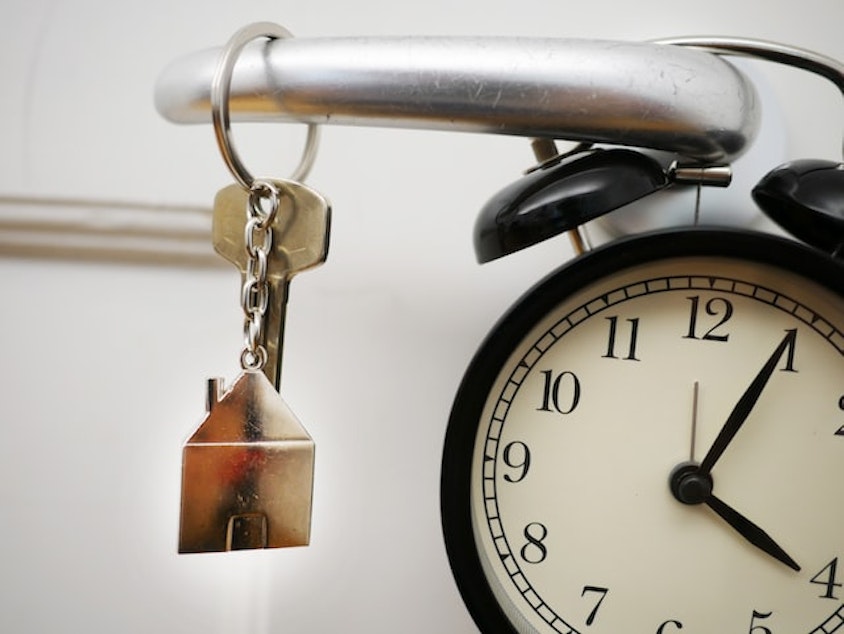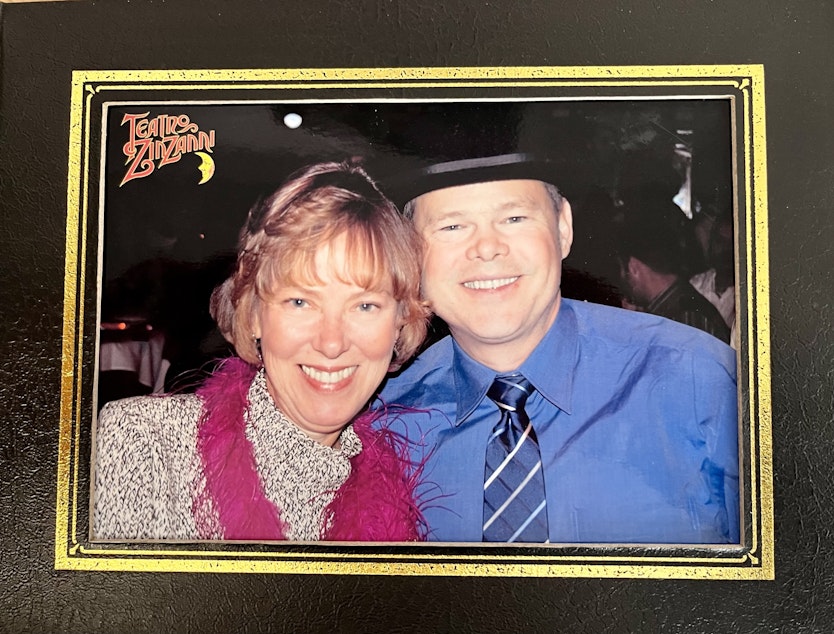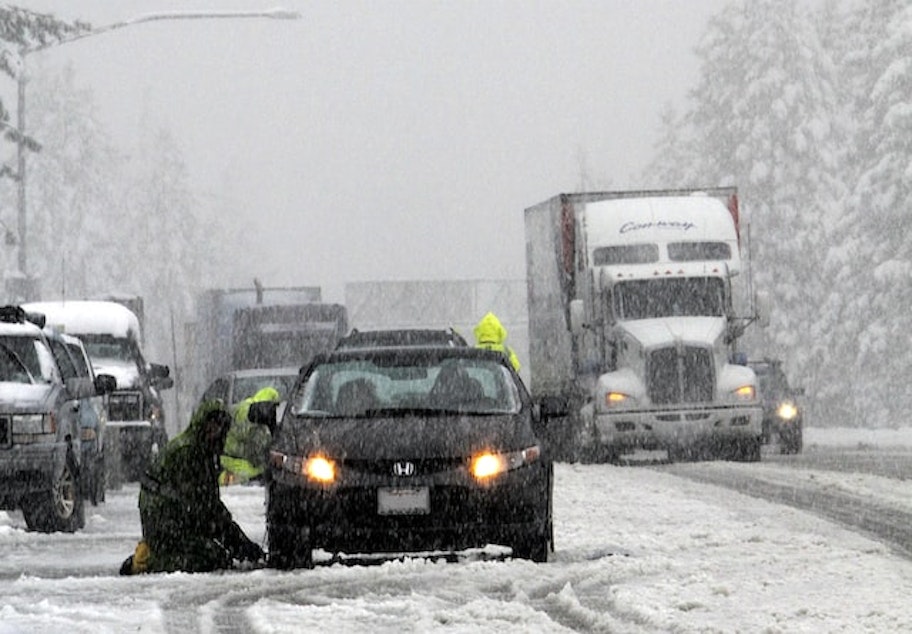Will the Seattle-area embrace housing solutions?: Today So Far

Here's some information that is not news to anyone: The Seattle region has a housing problem, and it's only slated to get worse in the years ahead. Here's some information that is news: We have solutions.
This post originally appeared in KUOW's Today So Far newsletter for December 22, 2022.
Whether or not our region will embrace any solutions is a big question. Joshua McNichols has been KUOW's go-to reporter for issues like regional growth and housing. It's a tough beat. This issue is very, very complex. The result is that a lot of people are being displaced as they search for a stable place to live. Joshua's latest series, The Ripple Effect, is a comprehensive dive into our housing issue, and the most recent story takes a look at solutions being tossed around, including:
- Subsidized down payments for first homes
- Community land trusts for lower-income homebuyers
- Creation of new "missing middle" housing, such as duplexes, triplexes, townhomes, row houses, and small condo buildings
- Opening up the ability for governments to create dense communities
Beyond bullet points are personal stories, and local communities built upon generations of neighbors living in and around Seattle. That is what is at the core of all this. There are a lot of angles into this. I highly recommend you keep up with Joshua's full series on this, The Ripple Effect. Also, take the time to listen to the comprehensive Ripple Effect audio feature, which KUOW has conveniently podcasted for you. It's the perfect coverage to pair with your commute ... which brings me to another thought around all this.
Consider the situation we are all in — and I mean all of us. If you're living in the burbs and complain about tents along the road, or traffic, or other regional woes, housing is a problem woven into all of this. As Joshua reports in today's story, the Seattle metro area needs 800,000 new homes by 2050 — that's double the number of homes in Seattle right now. One current Burien project aims to house 26 families. Another project in Renton could house 35. Such smaller-scale projects can't keep up with the demand.
With that in mind, I'd like to highlight one more solution, which is not new: remote work. Sure, this doesn't solve the decline of Seattle communities, or every problem we have, but it is a piece of the puzzle. Let people find the housing that works for them, and remove the commute.
Sponsored
If you've paid attention to KUOW's reporting over the past couple years, as well as this newsletter, you're aware that remote work has surged ever since the pandemic forced a lot of people to stay home. But this phenomenon is not new, it's simply been exacerbated. Seattle has been talking about how to counter massive rents and high costs of living for years now. In 2018, Joshua also reported on a growing trend of remote workers, many of whom call Seattle "home," but ditched local rents for better, affordable living. At the time, it was notable that the number of telecommuters in the USA was greater than the number of folks using public transit.
Pandemic conditions aren't the same today as in 2020, but the advantages of remote work linger.
"These are the realities of 21st century working," Anne Helen Petersen told Seattle Now in September.
Petersen is an expert on remote and hybrid work, and is co-author of "Out of Office." She adds that companies and managers "can vote for the future, or you can try to hold on to those old ways of working from the past, and then pay a consulting company in five years to tell you to get with the future. Those are your options."
Just a taste of what KUOW/NPR has been reporting around this:
Sponsored
- If your boss doesn't like remote work, it's probably because they're a bad boss
- Seattle-area video game industry finds that remote/hybrid work means living situations dramatically improve, and that's good for employees
- 46% of downtown Seattle workers went remote in 2021
- Gen Z has mixed feelings about working from home
- Employees are willing to accept lower pay in order to work remotely
Not every person, job, or situation is apt for remote work. But for those who can, we should be encouraging as much remote, out-of-the-office work as possible. We have an opportunity to remove cars from commutes, freeing up road space for those who need it. The 2022 State of Downtown Seattle report noted that about 40% of downtown Seattle workers lived within the city. That means that 60% (the majority) of workers are commuting into town from outside the city.
Nationally, between 2019 and 2021, the number of remote workers tripled, according to the Census Bureau, which further notes that this phenomenon had dramatic, positive effects on the road. The average one-way trip dropped to the lowest in a decade — 25.6 minutes. On top of that, it's probably worth noting that Washington ranks among the top 10 best states for remote work, and Seattle already ranks second in the nation when it comes to its share of remote workers.
That's my most reasonable, lay person suggestion. My only other idea is to invent time travel so we can go back to the 1980/90s and convince the Puget Sound region to embrace mass transit projects, and better housing policies, fixing some of the problems we have today. Of course, flux capacitor technology is lacking. And, obviously, there is the uncertainty of whether we would alter our current timeline, or create an alternate timeline existing parallel to our own. It's probably just easier to get all these solutions working together.
Like I said above, the issue is complex. If you're more into things like experts, officials, and deep reporting, check out Joshua's full Ripple Effect series, here. Beyond that, I'd love to hear from TSF readers about their thoughts on remote work, housing solutions, and other ideas for how our region can meet the challenges ahead. Email me at dyer@kuow.org.
Sponsored
AS SEEN ON KUOW

Bobby Hawran, right, and his sister Bobbie Reagan, left (yes, they share a first name). Bobby Hawran died after overdosing at his north Seattle apartment on August 4, 2022. But his apartment continued to be occupied and building managers could not evict the people who remained. The situation was complex, and led to a shooting at the Greenwood neighborhood apartment building in October 2022. (Courtesy of Bobbie Reagan)
DID YOU KNOW?
If you're like me, when you've ordered chicken tikka masala at an Indian restaurant, you've assumed that it's a dish that goes way back when, somewhere curry is sourced, so far that its inventor is lost to time. Turns out, it only goes back to the '70s, in Scotland, and its inventor is well known. That man, Ali Ahmed Aslam, died this week.
Sponsored
When he was a boy, Aslam immigrated from Pakistan to Glasgow in the '60s, and started a restaurant, Shish Mahal, that is still cooking today. The story he has told in the past is that, sometime in the 1970s, a customer came in and complained that the chicken tikka was too dry and wanted a way to fix it. A creamy tomato sauce was added and it went over well. The recipe was refined to become chicken tikka masala and it became so popular, it is now served at restaurants across the globe. It should be said that there are other restaurants and cooks around the UK who also claim to have invented this dish, but Aslam has generally garnered the headlines over the years. When his death was announced this week, the headlines all said the "inventor" of chicken tikka masala passed away.
ALSO ON OUR MINDS

Temperatures fall far and fast as a winter storm threatens the U.S.
Temperatures plunged far and fast Thursday as a winter storm began forming ahead of Christmas weekend, promising heavy snow, ice, flooding and powerful winds across a broad swath of the country and complicating holiday travel. In much of the country, the Christmas weekend could be the coldest in decades.

